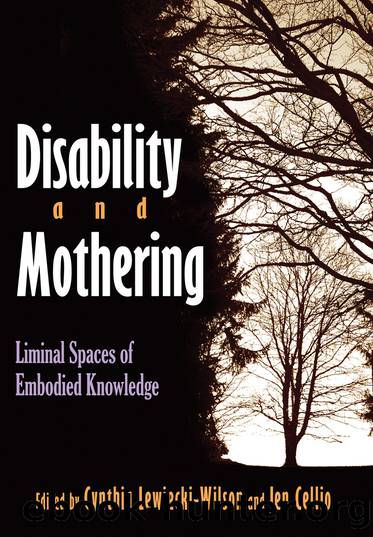Disability and Mothering by Lewiecki-Wilson Cynthia;Cellio-Miller Jen; & Jen Cellio

Author:Lewiecki-Wilson, Cynthia;Cellio-Miller, Jen; & Jen Cellio [Lewiecki-Wilson, Cynthia && Cellio, Jen]
Language: eng
Format: epub
ISBN: 9780815632849
Publisher: Syracuse University Press
Published: 2016-01-14T05:00:00+00:00
1. I put terms like âfitnessâ and âhealthâ in quotation marks because they are cultural constructs with prejudicial regulatory functions. âFitness,â as a metaphor, highlights this fact since it implies that bodies must be made to âfitâ a certain size or shape dictated by religion, fashion, political exigency, cultural taboos, etc.
2. See Mairsâs Ordinary Time: Cycles in Marriage, Faith, Renewal (1993) for a more extended view of her âdisability theology.â
3. As a Catholic, myself, I am well aware that modern Catholicism is not often practiced in the liberal and mystical fashion that Mairs embraces, as Catholicism, too, has been changed by the individualistic rationalism in âthe Westâ today. (Here, the connotation and denotation of âWestâ clearly diverge, as cultures to the south of the United States are more likely to maintain a mystical or communal Catholicism.)
4. Moraga explains her journey back to her roots as having begun in contemporary Mexico, where she encountered her own âcultural outsiderhoodâ as a Chicana lesbian, leading her back beyond the reach of living cultures to the pre-Columbian temples, where it was not the peoples or their visible legacy but âthe natural landscape in which those templos were placedâ and âthe buried historyâ contained within them âthat brought a shudder of recognition to the surface of [her] skinâ (Moraga 2001, x). This is a past emptied of peopleâpeople who would inevitably judge, exclude, or resist a Chicana feminist understanding of indigenous Mexicoâand felt through an organic or mystical connection, free from the constraints of history. The connection Moraga feels to ancient Mexico is an ideal, rooted in ideas and cosmology, not a realist genealogy.
5. Mairsâs understanding of Catholicism is equally resistant to hierarchy and oppression. In Ordinary Time, Mairs argues that âthe Community of Godâ translates into âjust distribution of all goodsâ and âa new world orderâa wholly fresh way of conceiving relatedness as inclusive and egalitarian rather than exclusive and hierarchicalâ (1993, 188, 190). Mairs argues this as a âCatholic worker,â but she suggests that any spiritual path (God, Allah, Mother Earth, chaos) can lead to this conclusion (8).
Download
This site does not store any files on its server. We only index and link to content provided by other sites. Please contact the content providers to delete copyright contents if any and email us, we'll remove relevant links or contents immediately.
Cecilia; Or, Memoirs of an Heiress — Volume 1 by Fanny Burney(32546)
Cecilia; Or, Memoirs of an Heiress — Volume 2 by Fanny Burney(31944)
Cecilia; Or, Memoirs of an Heiress — Volume 3 by Fanny Burney(31929)
The Great Music City by Andrea Baker(31916)
We're Going to Need More Wine by Gabrielle Union(19034)
All the Missing Girls by Megan Miranda(15954)
Pimp by Iceberg Slim(14488)
Bombshells: Glamour Girls of a Lifetime by Sullivan Steve(14056)
For the Love of Europe by Rick Steves(13906)
Talking to Strangers by Malcolm Gladwell(13347)
Norse Mythology by Gaiman Neil(13345)
Fifty Shades Freed by E L James(13232)
Mindhunter: Inside the FBI's Elite Serial Crime Unit by John E. Douglas & Mark Olshaker(9319)
Crazy Rich Asians by Kevin Kwan(9277)
The Lost Art of Listening by Michael P. Nichols(7494)
Enlightenment Now: The Case for Reason, Science, Humanism, and Progress by Steven Pinker(7306)
The Four Agreements by Don Miguel Ruiz(6744)
Bad Blood by John Carreyrou(6611)
Weapons of Math Destruction by Cathy O'Neil(6264)
